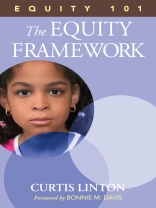Equity is key to eliminating achievement gaps
Can today′s schools help all students achieve at grade level, regardless of race, income, ethnicity, gender, and language? In Equity 101, visit schools and school systems that have created the expectations, rigor, relevancy, and relationships in order that high levels of achievement become the norm, no matter the student′s diversity. This first volume of a four-book series outlines a simple, yet powerful Equity Framework for school leaders to implement institutional equity.
Based on the common characteristics observed in highly successful diverse schools throughout North America, Equity 101 provides the foundation necessary for educational leaders and teachers to equitize their school and school systems by addressing systemic limitations, racism, and biases. Join best-selling author Curtis Linton in examining Whiteness as a lens for understanding our personal, institutional, and professional responsibilities in building equity for all students.
Readers have access to on-demand videos and an online community keyed to central concepts of the four books: The Equity Framework, Leadership, Culture, and Practice. Ultimately, this powerful series provides a clear vision and action plan for creating system equity—a place where excellence is the norm for all students.
Tabla de materias
Acknowledgments
About the Author
Prologue
1. Finding Equity
Realizing Equity
My Path to Equity
Black and White
Understanding My History
Embracing Diversity
Discovering Race
Norming Difference
Authenticating My Present
The Equity Lens
2. Defining Equity
Equity Success: Northrich Elementary
Exploring Equity
Describing Equity
Equity Definition
Deconstructing Equity
3. Framing Equity
Equity Success: Elmont Memorial High School
Framework Versus Strategy
The Equity Framework
Equity Framework: Characteristics
Equity Framework: Leadership
Equity Framework: Culture
Equity Framework: Practice
4. Personal Equity
Equity Success: Frankford Elementary
Individual Collectivism
Overcoming Biases
Acknowledging Privilege
Missionary Syndrome
Personal Equity Equals Passion
5. Institutional Equity
Equity Success: Sanger Unified School District
Understanding Institutionalism
Dominant Culture: Whiteness
Institutionalized Whiteness
Who Equitably Benefits?
Institutionalized Equity Equals Persistence
6. Professional Equity
Equity Success: Dunbar High School
Shifting Practice
Practice to Theory
Equitizing Standards
Implementing Equity
7. Moral Equity
Equity Plus Excellence
Equity Success: Behrman Charter Elementary
Staring Down Failure
The Journey Behind – The Journey Ahead
Internalizing Equity
Driving Equity
Epilogue
References
Sobre el autor
Curtis Linton is a co-owner of The School Improvement Network where he is co-executive producer of The Video Journal of Education and Teach Stream. He has spent the last 10 years documenting on video and in print the improvement efforts and best practices of the most successful schools and school systems across North America. Each year, he visits more than 100 classrooms and schools, capturing what they do to succeed with all students at the classroom, school, and system levels. Linton has written or produced dozens of award-winning video-based staff development programs. His areas of expertise include closing the achievement gap and improving minority student achievement, using data, leadership, effective staff development, brain research, differentiation, action research, and coaching. With the goal of delivering results-based professional development efficiently to large numbers of educators, he works with school systems to design comprehensive school improvement plans that integrate workshops, video, electronic media, and other resources. As a part of this, Linton conducts workshops on effective classroom practices. Linton also works extensively in the community, including serving on the Davis School District Equity Committee. Linton received his master’s degree in fine arts from the University of Southern California.












